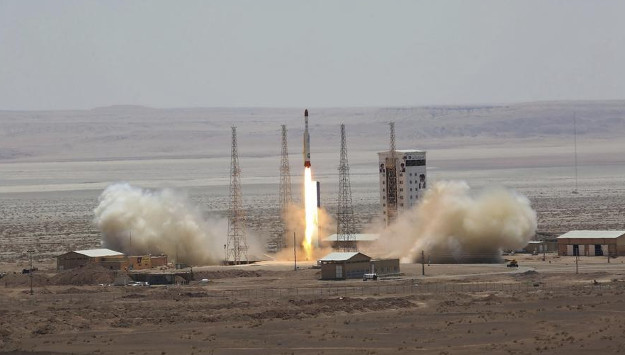Iran will launch a satellite called Sharif-Sat into orbit this year, the Iranian media reported today. Mansour Kabganian, the secretary of the Headquarters for the Implementation of the General Scientific Roadmap (H.I.G.S.R.), added that several satellites from three universities and two organizations are ready to launch. “According to this, a satellite of the Sharif University called Sharif-Sat will be launched this year, and another satellite by the Amirkabir University called Payam [Message] will be launched next year,” Kabganian told reporters on the sidelines of the 98th meeting of the H.I.G.S.R. The Amirkabir University of Technology professor further noted that the govenrment has increased its support for the satellite industry.
Last month, Iran’s Minister of Communication and Information Technology had also announced that the country had three satellites ready to be launched in the near future. “We have had talks with the Ministry of Defense as required and we will launch the satellites whenever they say,” Mohammad Javad Azari Jahromi told reporters in Tehran. He further noted that if the Ministry of Defense agrees, domestically-built launchers will be used for the new satellites. “Doosti [Friendship] Satellite has been ready for launch at the Sharif University in the past three months, and funding [for its launch] has already been paid to the Ministry of Defense.”
Comment: Iran’s growing space program has worried Washington and its allies in Europe and the Middle East. On July 28, a day after Iran successfully launched a space rocket called Simorgh, the United States, France, Germany and the United Kingdom issued a joint statement to condemn the action. “With its latest launch of a Simorgh space launch vehicle on 27 July, Iran has again demonstrated activity inconsistent with UN Security Council Resolution (UNSCR) 2231,” the statement added. The Western nations also called on Iran not to conduct any further ballistic missile launches and related activities.
Iranian leaders, however, brushed aside Western criticism of their space program. "Unfortunately, the launch of satellites has become a political issue in the world, but the claim that launching satellite is against the nuclear deal is basically wrong as we are entitled to this right and we can make an utmost use of this possibility in our country," said Mahmoud Vaezi, then-minister of communications and information technology. President Hassan Rouhani also praised the launch of Simorgh. "Today, space science is very important for us and the greater our scientific power is, the greater will be our sovereignty and dignity," he wrote on his Instagram account.
Earlier this month, the head of Iranian Space Research Center, Hassan Haddadpour, noted Iran plans to place three remote sensing satellites and one communications satellite in orbit by 2021.
In July, Iran also inaugurated the Imam Khomeini Space Center, which Iranian leaders described a "turning point" in the country's space activities. Hossein Shahrabi, the chairman of Iran's Sairan Space Group, told the Iranian state T.V. that "the space center would allow Iran to start competing with world powers for launching light-weight satellites to low orbits of the earth".
Iran successfully launched into orbit its first indigenous data-processing satellite, Omid (Hope), back on February 2, 2009.
As part of a comprehensive plan to develop its space program, Iran also successfully launched its second satellite, dubbed Rassad (Observation), into the earth’s orbit in June 2011. Rassad’s mission was to take images of the earth and transmit them along with telemetry information to ground stations.
The country’s third domestically-built Navid-e Elm-o Sanat (Harbinger of Science and Industry) satellite was sent into orbit in February 2012.
U.S. officials have expressed the worry that Iran’s satellite and space work may function as a cover to produce intercontinental ballistic missiles (I.C.B.M.s). Such long-range missiles could carry a nuclear weapons and target not just Israel and other regional countries but also Europe and the United States. The U.N. Security Council Resolution 2231 calls upon Iran not to produce I.C.B.M.s or similar long-range missiles.


